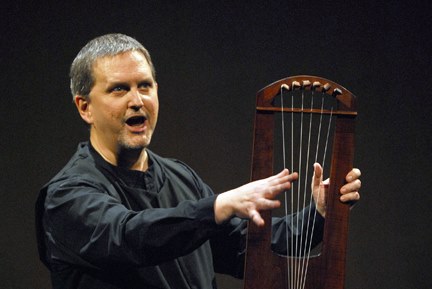Bagby’s “Beowulf” collapses the centuries with harp, voice and soul

Benjamin Bagby performed “Beowulf” Sunday at Corpus Christi Church to open the Music Before 1800 series.
As Benjamin Bagby paused to retune his harp and rest his voice during his performance of Beowulf Sunday afternoon at Corpus Christi Church, he mentioned that the Medieval scops could never take a break if they had a cold (as Bagby did), and neither would he.
Bagby played the part of the scop—an Old English performing poet—at this season’s opening concert for Music Before 1800, accompanying himself on a modern replica of a 7th-8th Century harp as he told the epic tale of the great hero of the ancient Geats, who slew the monster Grendel.
This was, of course, a rare experience—who else does this, not just performing the poem but learning Old English to do it? Bagby is one of the leading scholars and performers of Medieval music, but still this is an extraordinary event.
Beowulf was once regularly read as a staple of high school English classes, but never actually heard. There is a debate among literary scholars about the very existence of the scop, with an argument that Old English poetry was a written, not oral tradition.
There is no harm in Bagby making the case for oral lineage, though, because performing poetry—reciting, acting it out, and especially singing it—is the ancient foundation of epic literature and storytelling in cultures all over the planet.
And Bagby, even with a cold and a recalcitrant instrument that needed frequent retuning, does this so well. The Sunday performance showed the essence and strength of Beowulf far better than his Zankel Hall performance in 2014. There, on stage and with concert lighting, he seemed imprisoned behind glass, demonstrating a historical idea but, as a storyteller, separated from the audience. Beowulf did not come alive.
But in an intimate space and with a smaller audience facing him from the pews, Bagby’s manner was much freer and more familiar. He was the poet at court, telling a tale of things that might have been, alternately ennobling, entertaining, and gripping, as if all were in the great mead-hall that Grendel was ravaging.
This was not the complete 3,200-line poem, Bagby related the story up through the hero’s defeat of the monster, which took about a tidy 80 minutes.
He accompanied himself with a series of repetitive modal turns and riffs, varying from three to seven notes, all revolving around a central pitch. He played these as fragments, holding a static place at key moments in each scene. That was the extent of the musical formal design; the story itself carried everything along.
Bagby was excellent in varying manner and tone, from the attitude of an (ancient) entertainer, to foreshadowing the terror to come as Grendel was about to ravage Hrothgar’s mead-hall, to a fine differentiation between a drunken Unferth doubting Beowulf’s exploits and the hero’s own calm and justifiably proud response.
The music took flight there, Bagby singing with fluid rising and falling phrases over a fast, strong, 6/8 pulse. There, and through the fight itself, he sang as the hero with a characterization that was generous and confident.
From a contemporary perspective, Bagby’s Beowulf appears extra-musical in that the music seems less essential than the story-telling. But this is an illusion. We have had over a thousand years of music that Glenn Gould said was inherently artificial; not found in nature and made solely by man in the abstract.
With Beowulf, Bagby collapses the intervening centuries from the 7th to the 20th—it is ur-musical, coming from the place in the mind and body where storytelling via speech, propelled by eloquence and excitement in the mind and body, crosses the threshold into song. That is eternal and ever-present.
Vox Luminis sings Bach Motets 4 p.m. October 28 at Corpus Christi Church. mb1800.org